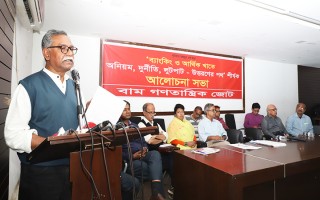Changes sought to save financial sector
Speakers at a discussion on Monday said that unending irregularities and misappropriation of funds in banks, capital flights, inequality and the rise of the super-rich could not be addressed unless the state mechanism was changed.
The present ruling party became friendly towards ‘bank dacoits’ and the ‘affluent’, they said while pointing to the series of loan scams in Sonali, BASIC, Janata and Padma banks and scandals in the share market against the backdrop of measures such as offering relaxed loan rescheduling facility to errant borrowers and mopping up funds from the state-owned entities.
They lamented that the country’s macro-economy was in danger although it was steered by the best finance minister in this region at the interactive discussion on ‘A way-out for overcoming maladies in the county’s financial sector’ at Jatiya Press Club.
Left Democratic Alliance, a platform of the eight left political parties, organised the programme to highlight the crises that threaten to squash the banking sector, in absence of accountability and regulatory lapses by the Bangladesh Bank.
The alliance would siege the central bank on February 26, protesting against the bank’s failure in enforcing its rules and regulations to protect the interest of savers providing 95 per cent of the bank’s fund, said its coordinator Bazlur Rashid Firoz.
Earlier, he presented the keynote in which he described the present situation in the country’s banking sector plagued by bad loans, deterioration of bank-client relationship and recommended 13 points to pull the sector from the abyss.
Communist Party of Bangladesh president Mujahidul Islam Selim, Socialist Party of Bangladesh general secretary Khalequzzaman, former Bangladesh Bank deputy governor Khondkar Ibrahim Khaled, the National Committee to Protect Oil, Gas, Mineral Resources, Power and Ports member secretary Anu Muhammad, Dhaka University economics teacher MM Akash, Credit Rating Information and Services Limited president and CEO Muzaffar Ahmed and Dhaka University economics teacher Rashed Al Mahmud Titumir, Workers Party of Bangladesh (Marxist) general secretary Iqbal Kabir Zahid and Jatiya Mukti Council general secretary Faizul Hakim Lala took part in the discussion.
Mujahidul Islam Selim said that the ruling party was hiding the real fact about the economy by interpreting statistics in its own manner.
Even if a person’s half body was kept on fire and the other half on ice, the government would say the man was kept in a tepid zone, he said mocking the government’s effort in hiding the truth.
He said that banking business was overshadowed by political business and parliamentarianism and the market economy turned politics into market-policy.
He demanded that those within the government were giving false impressions about the economy should be punished.
Khalequzzaman said most of the state organs could not contribute anymore to the peoples’ welfare which necessitated a change in the state mechanism.
Economist MM Akash said that the government was sweeping the problems under the carpet while referring to the bailout fund provided to the Farmers Bank, renamed as Padma Bank.
He said loanable fund in the banking sector was reducing fast due to growing bad loans, which, according to keynote paper, stood at Tk 1.16 lakh crore until September 2019, marking a rise of Tk 93,807 crore in the last 12 years.
The amount of bad loan would be much higher, said Akash while quoting an International Monetary Fund report that calculated the amount close to Tk 3 lakh crore because of written-off loans.
ANU Muhammad said that the government was providing bank licence, although it was already proved that private commercial banks were resorting to corruption and loan frauds.
He lamented that ‘black money holders’ were paying less tax and the errant borrowers were given privileges.
Rashed Al Mahmud Titumir said political solution was a must to revive the sector.
Ibrahim Khaled said that the government was totally detached from the people, a fact that resurfaced during the city polls in Dhaka. He felt that the government become alienated from the spirits of the country’s War of Independence.
He noted that inequality was rising fast as the government could not bring the rich people under tax net.
CRIS president and CEO Muzaffar Ahmed opposed the establishment of asset management committee as suggested in the keynote for recovering the bad loans.
He said a separate bank should be established to deal with the bad loans.
News Courtesy: www.newagebd.net











